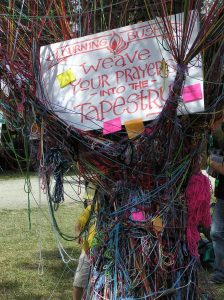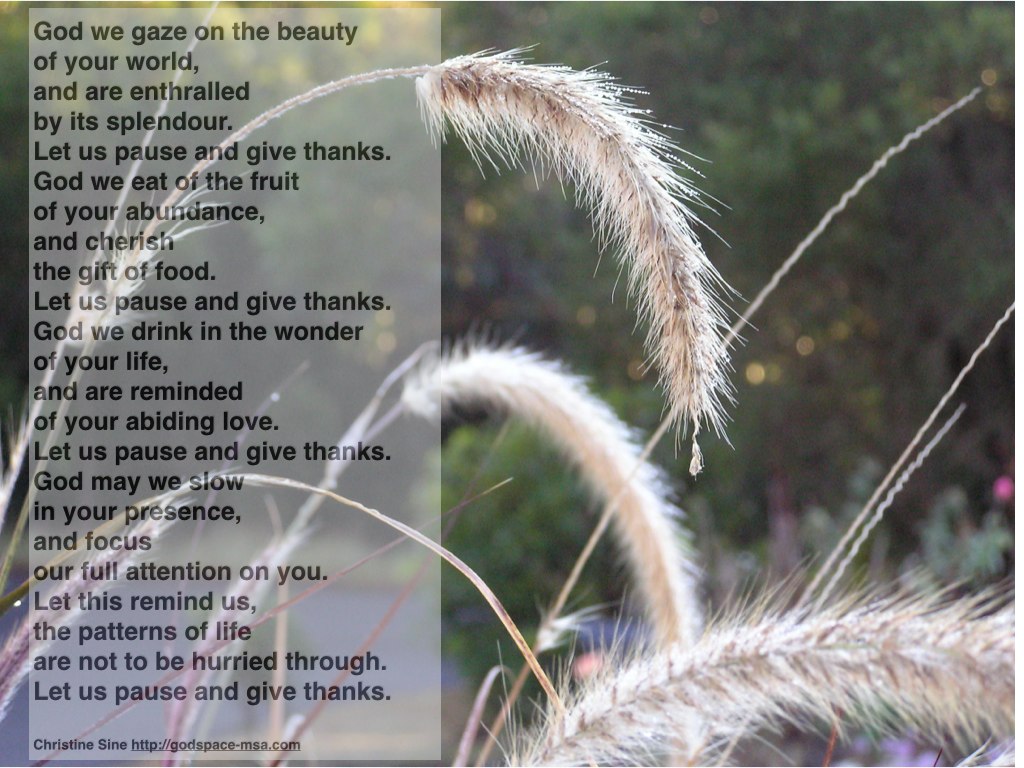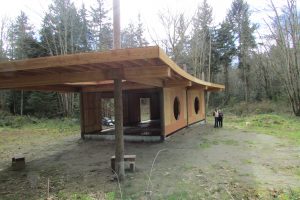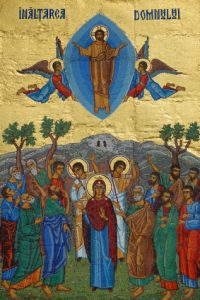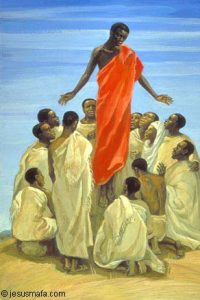Tom and I are back from our retreat time. My reading for our days away included part of Norman Wirzba’s wonderful book Food and Faith: A Theology of Eating. I have been reflecting on the meaning of communion and thought and his comment:
Eating is about extending hospitality and making room for others to find life by sharing in our own…. Eating is an invitation to enter into communion and be reconciled with each other. To eat with God at the table is to eat with the aim of healing and celebrating the memberships of creation…. Food is a gift to be gratefully received and generously shared. (11)
Reflecting on this statement has brought back many memories for me of meals shared and friendships forged. Hospitality has become one of the most important aspects of my life and will as many of you know be the central theme for sharing on this blog over the next few months.
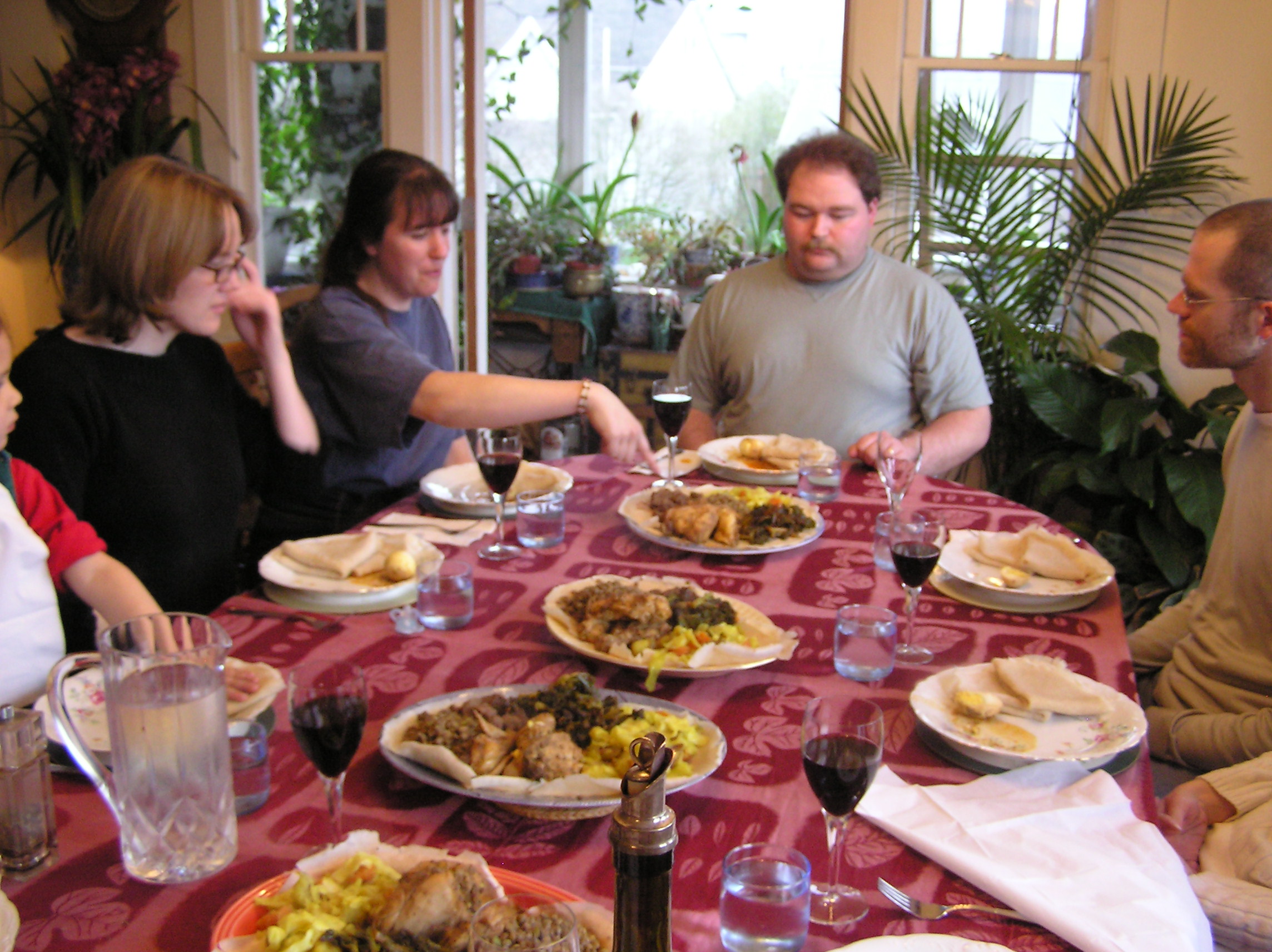
Enjoying Ethiopian meal at the Mustard Seed House
I still remember vividly when, several years ago, our good friends Melody and Gil George cooked a wonderful Ethiopian meal for us. The delicious hot and spicy sauces were spooned onto platters spread with layers of the Ethiopian flatbread injera. More mounds of injera dotted the table waiting for us to tear off pieces with our fingers so that we could scoop up the wonderful berbere flavoured wots. By the end of the meal all that remained on the platter were broken pieces of injera soaked with the remains of the sauces.
As we gathered the empty platters I was struck by how much this meal must have resembled meals Jesus ate with his disciples and those other friends of his – the tax collectors and prostitutes. Bread was far more than an adjunct to their meals, it was the very heart of their shared life together. The bread was broken so that people could share together the nourishment they needed to sustain life. And as the bread was broken there was implicit in the act, a sharing of hospitality, of togetherness and of community. Anybody who ate from their table, friend or stranger, rich or poor, young or old would enter into this shared community.
I was suddenly overwhelmed by the feeling that in eating together in this way we had shared in the communion of Christ’s body.
Contrast this to a church I was in recently in which the elements of the Eucharist were passed around in prepackaged sterile containers filled with a wafer of bread and a sip of grape juice. The only experience we shared together were those sounds we made as we ripped the covers off the communion elements. And even those were muted by our embarrassment at disturbing the quiet atmosphere of the moment. No wonder the congregation hurried away afterward with barely a thought for those with whom they had shared the pews.
I wonder how much we limit the celebration of our faith by partaking of the bread and the wine of communion in a sterile environment that disconnects us from the enjoyment of God in the midst of everyday life? For most of us, the celebration of the bread and the wine of the Eucharist no longer draws us into the wonder of communion with Christ and the intimacy of enjoying his presence in all of life’s celebrations and struggles. In fact, often it disconnects us.
I love Sara Miles’ book Take This Bread, in which she too grapples with the meaning of communion in the midst of everyday life. “It wasn’t a private meal,” she reflects.
“The bread on that Table had to be shared with everyone in order for me to really taste it. And sharing it meant I was going to be touching Christ’s body at St Gregory’s… Looking into Christ’s eyes outside the church through the cheery yuppie with the sports car and the veiled Muslim clerk at Walgreens. Listening to Christ’s voice in other churches… I was going to get communion, whether I wanted it or not, with people I didn’t necessarily like.” (97)
For the early church, communion was about celebrating the great feast of life together, not just with each other but also with God who gave this gift of life to all who shared in the meal. Hospitality was central to faith because was a reminder of the fact that in the sharing of food Christ was present in our midst. More than that, as all sat down together the barriers between rich and poor, slave and free, male and female were dissolved. The sharing of meal opened a doorway to the wonders of God’s eternal world in which we will one day all feast together at the great banquet celebration of God.
I think it is time we rediscovered the true hope and celebration of communion as it was understood by early followers of Christ. What a wonderful hope we look forward to every time we share a meal and take time to recognize that Christ sits down at the table with us. As we pass round the food it is his life that we are sharing. It is his life that nourishes our bodies and our spirits, drawing us together into a community of love and mutual care in which once more all barriers are broken down and we share together of the abundance and shalom of God’s kingdom.
As an Amazon Associate I receive a small amount for purchases made through appropriate links. Thank you for supporting Godspace in this way.
Tom and I are away on retreat, listen and discerning God’s guidance for the next several months. This is always a refreshing and renewing time for me and I look forward to these days with great expectation. I am confident that God always hears what I have to say and God always speaks to me.
As we got ready yesterday I found Jesus words before the raising of Lazarus revolving in my mind:Father, thank you for hearing me. You always hear me, but I said it out loud for the sake of all these people standing here. (John 11:41, 42)
I was struck particularly by the confidence of that prayer. Jesus knew that God heard him. He didn’t feel the need to shout or try to get God’s attention by repeating his prayer over and over.. He didn’t feel the need to coerce God into doing something for him, he just acted in the confidence that God heard him and that God knew best how to answer his prayer.
How often I come to God unsure of whether or not God is listening. How often I come feeling that I need to convince God to listen to what I am saying and take notice – more like the psalmist who cries God hear my prayer unsure of God’s attentiveness. How often I question the seeming lack of response.
What does it take for us to live in that confident place of knowing that God hears our prayers?
First we need to come in anticipation and gratitude – Jesus thank you is a heartfelt cry of gratitude to One that Jesus knows as a loving and caring father. Gratitude awakens us to the fact that God is already at work in the situation we are praying for. It opens our eyes to see what God is doing and molds our prayers to the divine will. One of my friends once told me that whenever she has a prayer request for God she starts with a time of silence to ask OK God what are you already doing in the midst of this situation? It is a revolutionary and powerful way to pray. Not just acknowledging God’s activity but expecting and looking for it at every step. We do not worship a passive God but one who is already actively involved before we start to pray.
Second we need to come confident that we are praying the right prayer. I have often wondered why Jesus waited two days before coming to Bethany to see Lazarus. I suspect that he spent at least part of that time listening for God’s voice, asking OK what do you want me to do here? I don’t think he headed off for Bethany until he was confident that what he planned was God’s will. So often we pray based on our wants rather than God’s desires. So often our motives are self centred not God centred. No wonder we don’t always get the answers we expect.
Third we need to come with a sense of the presence of God deep within our being. So often we pray out of a sense of our own needs or concerns without taking time to centre ourselves on the presence of God and remind ourselves that the One to whom we offer our prayers can and will only, ever respond in the loving way. God who is love can only respond from a heart of love. If we become confident of that nothing can shake our prayers and our eyes will always be open to God’s loving response.
Fourth we need to come expecting and looking for God’s answers. So often I pray a prayer and then dash on to the next thing, not taking time to notice and savour what God is doing in response to my request. We not only need to give thanks for the fact that God hears our prayers, we also need to give thanks for the answers.
I have a friend who keeps a prayer journal – jotting down his prayers, writing out his hopes and expectations for that prayer and then writing down the response that comes. He sees this as a way to more closely align his will with God’s. I think this is a wonderful idea but to my embarrassment I must admit that I have never implemented it.
Fifth we need to recognize that our prayers are part of a tapestry as this photo above suggests. They do not stand alone and the answers we get must be woven into that same tapestry. As a simple example it is no good praying for rain when our neighbour is prayer for sun and expect everyone to get their prayers answered. Maybe a better prayer would be God nourish the earth with rain in season and help me to appreciate each day as a gift from you.
In response to my reflections I wrote this short prayer which I am hoping it will also revolve in my mind and draw me closer to that abiding presence of God
Lord thank you that you hear our prayers,
Weave them into your tapestry.
Thank you that you always answer from your heart of love.
Draw us close with your responses.
Thank you that you are at work in every situation,
Transforming, renewing, making all things new.
Tom and I are heading out this morning for our quarterly retreat time and I know that the question at the forefront of my mind is” Is it time to slow down? As you can see from the prayer above which I first posted on the Facebook page Light for the Journey yesterday, I am already thinking about what slowing down looks like.
Life has been frantically busy over the last month and I know that when that happens my life gets out of synch. When that happens I start to see myself as a consumer rather than as a child of God. I start to feel that work is more important than relationships and that pleasing myself is more important than pleasing God. None of that is what God intends. I always remember Richard Foster saying Busyness is not of the devil, it is the devil. I think he is right. The busier we are the less connected we are to our inner selves, to others and to God.
Ironically I find that I need to slow down in order to recognize my need to slow down. Unless I deliberately build routines into my schedule that encourage me to focus away from work onto relationships and away from the computer onto God’s world I get into a vicious cycle that moves me from one busy activity to another.
There are several signs I look for that make me aware that I am getting too busy. Some of them seem very trivial but are great early warning signs that I must confess I don’t always take notice of.
- I don’t want to take time for my morning routines. I use a sonic toothbrush which is set for 2 minutes of brushing and there are times when I get very impatient with the cycle. Then I start to skip my morning exercises. Then I cut back on my time with God. And surprise, surprise, then I start making excuses for why work is more important than anything else. These, I am learning are good indications that I am either getting too busy or too stressed to look at life’s essential routines realistically.
- I don’t want to stop for meals. Fast food and meals on the go are for me a good indication that my life is out of synch. I quickly forget that food is a gift from God meant to be enjoyed and savoured. It is not just another commodity meant to be consumed.
- I cut out my daily walks. Walking is a great way for all of us to reduce stress. This is not treadmill walking or a workout at the gym that I am talking about here. It is walking the neighbourhood or for me, around Greenlake with its three mile trail that is important. This kind of walking encourages us to pause and take notice of God, to recognize my own insignificance and to relax in the fact that I do not bear the burden of seeing God’s world changed on my own.
- I refuse to say no to new projects even though my time is already fully committed. It is nice to be needed and I know I am not alone in accepting more on my plate than I should. Unfortunately the busier I get the less time I take to reflect when I am asked to add something else to my schedule. Learning to say “let me pray about it” or “let me talk to my husband” are two responses that always help me be realistic. The busier we get the more we need to seek the counsel of others before committing ourselves.
So my question for all of us today is: What are the signs that your life is getting too busy and how do you respond?
Brigid and the Hospitality of God is the theme for our annual Celtic retreat this August. Come join us on Camano Island WA for this wonderful weekend. More details here
- share a time of guided retreat and reflection beginning at 9am Saturday morning with coffee and snacks. enjoy the prayer trails and prayerful activities during the afternoon celebrate with a BBQ potluck dinner that night.
- Both kids and students will have a program designed especially for their time at the Retreat.
- We also invite you to camp with us Friday and Saturday nights, and to share morning and evening prayers and a time of reflective worship Sunday morning.
- Find out about the different options here
Jesus, who welcomes all who come to him, shows us the pattern that is repeated in Eastern hospitality and in the Celtic way of life. The idea that the one I welcome is the “Christ in the stranger’s guise” calls me to recognize the image of God in all persons and the presence of God in all creation. This understanding changes my attitude toward every person. I open my heart and seek the good, rather than raise my walls of defense and look with suspicion. Celtic spirituality teaches not only hospitality to the stranger but welcome to the poor and the marginalized.
At the retreat we will use the life of Brigid, one of my favourite Celtic saints, to guide us. She became abbess at the monastery of Kildaire where, under her leadership, a thousand meals were reportedly served each day. I always use Brigid’s Feast as a grace for our retreats. This year our liturgies, songs and scripture readings will also revolve around her love for the poor and her generous hospitality.
Each year our Saturday meals are potlucks with delicious salads and desserts contributed by attendees. This year we would like to start collecting some of these wonderful recipes to help us get to know each other better. So if you plan to come, write out your recipe with your name and contact information send it to us so that we can make these available for other attendees. This year’s retreat will be a grand summer celebration of welcome and feasting.
Most exciting of all we will dedicate our first building on the property. Last week Tom and I visited the site where the green roof is now being installed. It should be completed by the time of the retreat, and we hope that you can join us for this exciting celebration.
This post is out of date, please check out our latest resource list here.
Earlier today I posted this reflection in preparation for Ascension day May 29th. As you know my focus was more on the new creation that Jesus ascension ushered into being than it was on the ascent of Christ to the right hand of God, partly because so much of the language of ascent seems to focus more on the triumphalism of a militaristic parade rather than the ascent of a servant king whose advocacy will restore and renew all things.
Having said that I do not want to deny the exultant triumph of our risen Lord and the freedom his ascent has brought us. For the disciples this must have been an amazing day. They knew Jesus was alive. They knew he was the Son of God and the Saviour of the world, the long-promised Messiah. They knew that they would see him again when he returned, as he had assured them that he would, at the end of time and the day of resurrection. They knew that he still loved them, simply because he appeared to them after he rose from the grave and, most importantly, he had entrusted his mission on earth to them. They had begun to comprehend the nature of God’s love and power; so should we.
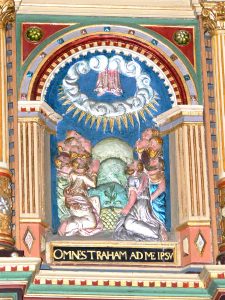
Ribe Cathedral. Pulpit ( 1597 ): Ascension of Christ with the latin inscription “Omnes traham ad me ipsum” ( All people I will draw to myself ) via wikimedia
So I wanted to share some of my favourite resources here to help us get ready for this day.
The United Methodist Church has some great resources. I love the exultant note of this prayer from Rev. Marilyn E. Thornton the Lead Editor for African American,
One: Let us gather as they gathered on the Mount of Olivet.
Let us remember the teachings of the law, psalms, and prophets.
Many: Ride on King Jesus, no one can hinder you!
Here is another from the reformed tradition With A Shout
And this by David Diephouse who teaches history at Calvin College
Our God goes up with shouts of joy!
Our Lord ascends to the sound of trumpets!
All: Sing praises to our God, sing praises!
Sing praises, sing praises to our King!
The Almighty rides in triumph.
The Almighty leads captivity captive.
Who shouts for joy? Who blows the trumpet?
The hosts of heaven sing the honor of his name;
they praise him with an endless alleluia.
And this prayer from the Catholic service for Ascension Day
God our Father,
make us joyful in the ascension of your Son Jesus Christ.
May we follow him into the new creation,
for his ascension is our glory and our hope.
We ask this through our Lord Jesus Christ, your Son,
who lives and reigns with you and the Holy Spirit,
one God, for ever and ever. Amen.
As usual John van de Laar at sacredise.com has some great resources – prayers, liturgies, even suggestions for hymns and youtube videos. You can check them out here.
Here is a good set of videos/loops from re:Worship
And as always textweek.com has a very comprehensive list of resources for celebrating Ascension Day
Obviously there are lots of other great resources out there too so if you have found something that is particularly helpful please leave a link in the comments below.
May 29th we celebrate Ascension day. What on earth is this you may ask? This is not a celebration that I grew up with, nor is it one that I have taken much notice of. It is not a celebration that most of us outside liturgical churches have ever heard of or ever really celebrated, but it is very important and I would highly recommend that you consider incorporating it into your worship cycle. I tend to think of this as a Catholic celebration and so was amazed therefore at the beautiful and enriching prayers I came across from many different traditions and thought that I would share some of them with you.
The fortieth day after Easter Sunday is a day of great significance as we celebration the ascension of Christ into heaven. It is also and, in some ways more importantly, a celebration of the new creation that Jesus’ resurrection brought into being. What beautiful imagery to carry with us for the rest of the season until Pentecost (June 8th). It seems such an appropriate celebration for those of us who are interested in sustainability and creation care.
I used this as the focus of my reflection last year Ascension Day is Coming: Celebrate the New Creation and found myself revisiting this imagery as I thought about Ascension Day this morning. Ascension day is a day of hope and promise. The ascended Lord will return to judge that which is broken and unjust. He will return as leader in a glorious future. in which he will abolish injustice, end suffering, destroy death and set up God’s new world of truth, righteousness and love.
Because Jesus ascended and sits at the right hand of God,
a new world has broken into ours –
a world in which justice does come for the poor,
freedom comes for the prisoners,
and healing for the sick.
Because Jesus ascended and sits at the right hand of God,
a new community has been formed –
a community that loves and cares for all members,
a family that welcomes all who are abandoned and rejected,
a place where all find a place of belonging.
Because Jesus ascended and sits at the right hand of God,
a new creation has begun –
all that was distorted is being restored,
all that is corrupted is being renewed,
all that was broken is being made whole.
Because Jesus ascended and sits at the right hand of God,
God’s new world has begun.
Yesterday was mother’s day, for most of us a time to celebrate our earthly mothers and in some cases grieve their loss. However yesterday in her sermon Morgan Schmidt reminded us that there are many images of God as mother in the Bible. God is both the perfect mother and the perfect father.
Yesterday afternoon I sat and contemplated some of the beautiful imagery of God as mother. Our world tends to be dominated by images of God as father, the images of the nurturing, caring God who holds us, grieves with us and laughs with us are less common.
It occurred to me that many of Jesus parables are really images of what a mother does for us:
As a mother nurtures and feeds us, God feeds us in the feeding of the 5,000.
As a mother binds up the skinned knee of her child, God binds up our wounds in the story of the Good Samaritan.
As a mother comforts and surrounds her children with love so God surrounds us
As a mother bears a child’s pain whenever possible and suffers with us when we hurt so Jesus bore our pain on the cross
There are other images that come to mind too.
As a mother believes in and brings to fulfillment the hopes and dreams of her children so God believes in our hopes and dreams.
Like a mother, God is the one who loves when it makes no sense.
We always recognize our mother’s voice and so too God is the one who calls us with a voice we always know.
A good mother is one who like God, desires our healing and brings us to wholeness.
Mothering will fill you with love, it will break your heart. It is the best thing in the world.
May we all remember God as our mother today.
As an Amazon Associate, I receive a small amount for purchases made through appropriate links.
Thank you for supporting Godspace in this way.
When referencing or quoting Godspace Light, please be sure to include the Author (Christine Sine unless otherwise noted), the Title of the article or resource, the Source link where appropriate, and ©Godspacelight.com. Thank you!

